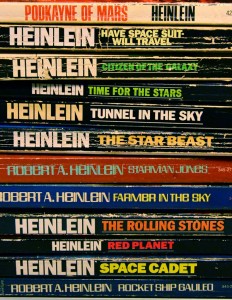Robert Anson Heinlein stormed the bookshelves of the Baby Boomer generation during the Golden Age of SF…which is to say about the time they were twelve years old. Having won the battle for their hearts and minds, he’s had little trouble occupying the territory and making inroads on successive generations over more than fifty years since the last (Have Space Suit Will Travel), was published. It’s still a powerful statement for a reviewer to liken a new YA author to Heinlein, promising a fast moving tale in which the main character leaves their familial homeworld to make a place amid the challenges of the greater galaxy of adults. As a story-type, it offers a voyage of high adventure, and in science fiction, one author blazed the trail to the stars: Robert Anson Heinlein.
The Scribner Juveniles
- Rocket Ship Galileo, 1947
- Space Cadet, 1948
- Red Planet, 1949
- Between Planets, 1951
- The Rolling Stones aka Space Family Stone, 1952
- Farmer in the Sky, 1953
- Starman Jones, 1953
- The Star Beast, 1954
- Tunnel in the Sky, 1955
- Time for the Stars, 1956
- Citizen of the Galaxy, 1957
- Have Space Suit—Will Travel, 1958
Berkley
- Podkayne of Mars (1963)
Today’s market has renamed the “Juvenile” category Young Adult (YA), and the edges of it have more to do with how a publisher decides to market a book than any hard and fast set of rules about its content, though it will still follow some variant of the RAH’s formula: a child voyages from dependence on adults to independence as an adult themselves. Even Paolo Bacigalupi’s recent “Windup Girl,” which is a pretty adult novel, though marketed as YA, nods to RAH, as the main character, an artificial party girl, moves from dependence on the adults in her world to find a place of her own. Granted, it’s resolution is far more dystopic than anything RAH wrote, though the initial setup could be compared to Citizen of the Galaxy, where the protagonist enters the stage as a slave to be sold at auction, but the story’s resolution, with the girl living on her own in a drowned and largely abandoned city, is a far cry from Thorby’s fate, assuming the mantle of responsibility for his family’s manufacturing holdings.
I have been writing the Horatio Alger books of this generation, always with the same strongly moral purpose that runs through every line of the Alger books (which strongly influenced me; I read them all). “Honesty is the best policy.”—“Hard work is rewarded.”—“There is no easy road to success.”—“Courage above all.”—“Studying hard pays off, in happiness as well as in money”—“Stand on your own feet”—“Don’t ever be bullied”—“Take your medicine”—“The world always has a place for a man who works, but none for a loafer.” These are the things that the Alger books said to me, in the idiom suited to my generation; I believed them when I read them, I believe them now, and I have constantly tried to say them to a younger generation which I believe has been shamefully neglected by many of the elders responsible for its moral training.
When one talks of Heinlein’s Juveniles, the acknowledged canon consists of twelve stories published by Scribners over just more than a decade, 1947 (Rocket Ship Galileo) to 1958 (Have Spacesuit Will Travel). RAH’s association with Scribners ended when they rejected Starship Troopers. The author, like his protagonists, had outgrown the genre.
There’s a distinct story arc that follows the books; In Rocket Ship Galileo, a friendly scientist puts together a spaceship in his backyard and takes the neighbor’s kids to the moon (where they find the Nazis have beaten them in setting up a base). This is delightfully reprized and updated in John Varley’s Red Thunder. As the stores move on, often in the same “Future History” universe, and never clearly out of it, we see humanity spread out into the solar system (Space Cadet, Farmer in the Sky, Red Planet, Between Planets) and eventually the stars (Time for the Stars, Starman Jones, Tunnel in the Sky) and space-faring humanity goes through its own voyage to adulthood, from explorer to colony to free nation, and finally to come into contact/conflict with galactic civilization (Have Spacesuit Will Travel) to have our maturity as a species challenged.
Starship Troopers, while one of my favorite novels, either breaks from this pattern or completes it, depending on how you look at it. The universe isn’t either empty, nor are the residents wise and benign, and if humanity wants to survive, let alone plant flags and colonies under distant suns, it’s going to have to fight for the chance.
Links / Sources
- Heinlein’s Juveniles: Still Contemporary After All These Years, by C. W. Sullivan III,http://www.heinleinsociety.org/rah/works/novels/heinleinjuveniles.html
- Starman Jones Introcution: http://www.webscription.net/chapters/9781451637496/9781451637496.htm
